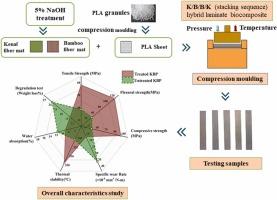Development of sustainable alkali treated and untreated kenaf/bamboo/polylactic acid biocomposites: A study of overall characteristics and its environmental aspects
IF 6.2
1区 农林科学
Q1 AGRICULTURAL ENGINEERING
引用次数: 0
Abstract
In the effort to mitigate environmental pollution there is a growing global demand for sustainable materials in place of existing synthetic one. In this research work, stacked hybrid laminate composite were produced by combining alkali treated kenaf and bamboo natural fiber mats as reinforcement with a biopolymer polylactic acid as matrix through compression moulding technique. The current work intends to study the outcome of surface modification of natural fibers which modifies their performance characteristics. Here the overall characteristics: mechanical, tribological, thermal and physical properties were investigated for the fabricated sample and the assessments were made between the alkali treated and untreated fiber composites. The alkali treated samples exhibited an enhanced tensile strength of 44.83 %, flexural strength of 108.13 %, compressive strength of 86.21 % and peak degradation temperature compared to the untreated samples. In addition, the tribological characteristics of the treated hybrid composites were studied. The inherent hydrophilic characteristics of natural fiber which leads to water absorption is resisted by the chemical treatment and it is also confirmed by the Fourier Transform Infrared (FTIR) analysis.Morphological analysis of the fractured and worn composites was also conducted to examine the microstructural changes and interface bonding within the developed composites. The biodegradability of the developed composites under soil burial test showed that the untreated composites exhibited higher weight loss percentage compared to the treated samples. The experimental results reveal that the alkali chemical treatment significantly enhances the suitability and compatibility of kenaf and bamboo natural fibers in polymer composites for sustainable construction products like roofing sheets and door panels in rural terrain regions.

可持续碱处理和碱处理的红麻/竹/聚乳酸生物复合材料的开发:总体特性及其环境因素的研究
在减轻环境污染的努力中,全球对可持续材料的需求日益增长,以取代现有的合成材料。本研究以碱处理过的红麻和竹天然纤维垫为增强材料,以生物聚合物聚乳酸为基体,通过压缩成型技术制备了复合层压板复合材料。本工作旨在研究天然纤维表面改性的结果,以改变其性能特性。研究了制备样品的力学、摩擦学、热学和物理性能的总体特性,并对碱处理和未处理的纤维复合材料进行了评价。碱处理后的试样抗拉强度提高44.83 %,抗折强度提高108.13 %,抗压强度提高86.21 %,峰值降解温度比未处理的试样高。此外,还研究了处理后混杂复合材料的摩擦学特性。天然纤维固有的亲水性被化学处理所抑制,并被傅里叶变换红外(FTIR)分析所证实。对断裂和磨损后的复合材料进行了形貌分析,考察了复合材料内部的微观组织变化和界面结合情况。对复合材料的生物降解性进行了土埋试验,结果表明,未处理的复合材料比处理过的复合材料具有更高的失重率。实验结果表明,碱化学处理显著提高了红麻和竹天然纤维在聚合物复合材料中的适用性和相容性,可用于农村地形地区的屋面板和门板等可持续建筑产品。
本文章由计算机程序翻译,如有差异,请以英文原文为准。
求助全文
约1分钟内获得全文
求助全文
来源期刊

Industrial Crops and Products
农林科学-农业工程
CiteScore
9.50
自引率
8.50%
发文量
1518
审稿时长
43 days
期刊介绍:
Industrial Crops and Products is an International Journal publishing academic and industrial research on industrial (defined as non-food/non-feed) crops and products. Papers concern both crop-oriented and bio-based materials from crops-oriented research, and should be of interest to an international audience, hypothesis driven, and where comparisons are made statistics performed.
 求助内容:
求助内容: 应助结果提醒方式:
应助结果提醒方式:


